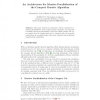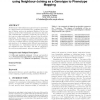PPSN
2004
Springer
15 years 27 days ago
2004
Springer
Current Genetic Algorithms can efficiently address order-k separable problems, in which the order of the linkage is restricted to a low value k. Outside this class, there exist hie...
PPSN
2004
Springer
15 years 27 days ago
2004
Springer
Genetic Programming (GP) provides evolutionary methods for problems with tree representations. A recent development in Genetic Algorithms (GAs) has led to principled algorithms cal...
GECCO
2004
Springer
15 years 28 days ago
2004
Springer
This paper presents an architecture which is suitable for a massive parallelization of the compact genetic algorithm. The approach is scalable, has low synchronization costs, and i...
GECCO
2004
Springer
15 years 28 days ago
2004
Springer
Abstract. Genetic algorithms have been a standard technique for engineers optimising water distribution networks for some time. However in recent years there has been an increasing...
GECCO
2004
Springer
15 years 28 days ago
2004
Springer
Previous work investigating the performance of genetic algorithms (GAs) has attempted to develop a set of fitness landscapes, called “Royal Roads” functions, which should be id...
GECCO
2004
Springer
15 years 28 days ago
2004
Springer
Traditionally, the mutation rates of genetic algorithms are fixed or decrease over the generations. Although it seems to be reasonable for classical genetic algorithms, it may not...
GECCO
2004
Springer
15 years 28 days ago
2004
Springer
The use of Genetic Algorithms in evolution of mutants and test cases offers new possibilities in addressing some of the main problems of mutation testing. Most specifically the p...
EVOW
2004
Springer
15 years 28 days ago
2004
Springer
Cellular Genetic Algorithms (cGAs) are a subclass of Genetic Algorithms (GAs) in which the population diversity and exploration are enhanced thanks to the existence of small overla...
PLDI
2004
ACM
15 years 29 days ago
2004
ACM
It has long been known that a fixed ordering of optimization phases will not produce the best code for every application. One approach for addressing this phase ordering problem ...
GECCO
2005
Springer
15 years 1 months ago
2005
Springer
Evolutionary relationships among species can be represented by a phylogenetic tree and inferred by optimising some measure of fitness, such as the statistical likelihood of the t...


